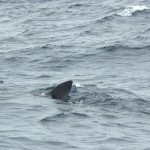
UTRECHT (THE NETHERLANDS)- As hurricane season in the North Atlantic is under way, marine biologists in The Telegraph reveal details of how sharks behave during adverse weather.
Like other fish sharks detect disturbances in the water, which cause changes in water pressure, allowing them to detect threats or prey.In sharks this is particularly sensitive and allows them to sense wounded or sick fish from the vibrations they produce.
However, the scientists found some evidence that sharks can detect a drop in air pressure that may indicate an approaching hurricane or storm.
Blacktips
A study in 2001 in young blacktip sharks at Mote Marine Laboratory showed that the fish take evasive action when faced with an approaching hurricane. The juvenile sharks normally stay in shallow water nurseries where they are protected from larger predators and have plenty of small prey to eat. However, as a tropical storm approached Terra Ceia Bay, where one such shark nursery was, in 2001, the young blacktips fled into deeper water several hours before the storm arrived.
Scientists believe this is because storms can be dangerous in shallow water as the winds cause powerful waves and currents that could sweep the sharks onto shore or into rocks.
When the storm had passed, all of the sharks then returned to the nursery.
Florida
Analysis of shark attacks off the Florida coast have shown that during more active hurricane seasons, the number of attacks decrease. This could of course also have something to do with less people going out for a swim in such rough weather.
Great whites
There is now also growing evidence that large adult sharks also take action to avoid storms. Dr Nick Whitney from the OCEARCH Global Shark Tracker, which has been tagging large ocean going sharks with GPS trackers, said they had seen changes in the behaviour of sharks as big as great whites in the path of approaching hurricanes.
Just before Hurricane Sandy arrived last year off the coast of South Carolina and Georgia, the team stopped receiving data from one great white shark they were monitoring called Mary Lee for a period of six days.
Read more at The Telegraph.
